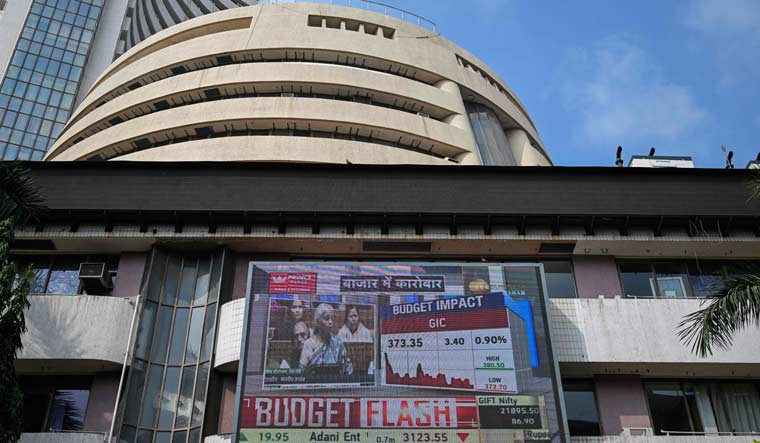Equity markets were range-bound on Thursday. With no big-bang announcements forthcoming in the interim budget, benchmark indices traded in a narrow band. While, they had opened in the green, they eventually closed slightly lower.
The BSE Sensex ended the day at 71,645.30, down nearly 107 points or 0.15 per cent. The Nifty50 index closed 28.25 points or 0.13 per cent lower at 21,697.45 level.
"Nifty saw the lowest intra-day volatility on a Budget day (0.80 per cent) in at least six years as the expectation build up ahead was limited," said Deepak Jasani, head of retail research at HDFC Securities.
Finance Minister Nirmala Sitharaman's pre-election Budget laid out the government's achievements in the past ten years. There were no big announcements in the Budget; it continued to focus on capital expenditure spending even as it stuck to the fiscal consolidation path, in fact surprising positively with a sharp cut in fiscal deficit target for 2024-25. There were no changes to direct or indirect tax, contrary to expectations that the government would do something here to give a relief to the middle class ahead of the elections.
The budget prioritised a balance between growth, supported by a continued emphasis on capital expenditure and fiscal consolidation by keeping the fiscal deficit at 5.1 per cent of GDP, said Rahul Jain, president and head of Nuvama Wealth.
"Nobody was expecting any major announcement in this Budget and hence we saw a range-bound trend with a negative bias," said Prashant Tapse, senior vice-president (research) at Mehta Equities.
Public Sector banks were among the major gainers on Thursday, with Indian Overseas Bank, Indian Bank, Bank of India, Canara Bank, Union Bank and Bank of Baroda among others surging between 3 per cent and 6 per cent. There was some expectation that drop in bond yields would boost their treasury income.
Shares of oil and gas companies also gained, with state-owned Oil India, Indian Oil, BPCL, Hindustan Petroleum and GAIL gaining 1-2 per cent.
On the other hand, several real estate stocks ended 1-2 per cent lower. While the government did expand the PM Awas Yojana (Grameen) and announced plans to launch a housing scheme for the middle class, there were no major incentives to boost the affordable housing market and there were also no tax incentives on home loans, which left people unhappy.
Several infrastructure and capital goods shares also ended lower. The Budget raised spends on capital expenditure to Rs 11.11 lakh crore for 2024-25. But, the 11 per cent year-on-year growth was lower than the 37 per cent increase in the capex spending announced in 2023-24 and that left some investors disappointed.
"The domestic market was marginally disappointed by lower than expected infra spending in the interim budget. However, the government's commitment to fiscal prudence, targeting a fiscal deficit of 5.1 per cent for FY25, is expected to improve the outlook on economic ratings. This led to a significant drop in India's 10-year (bond) yield to 7.04 per cent," said Vinod Nair, head of research at Geojit Financial Services.



